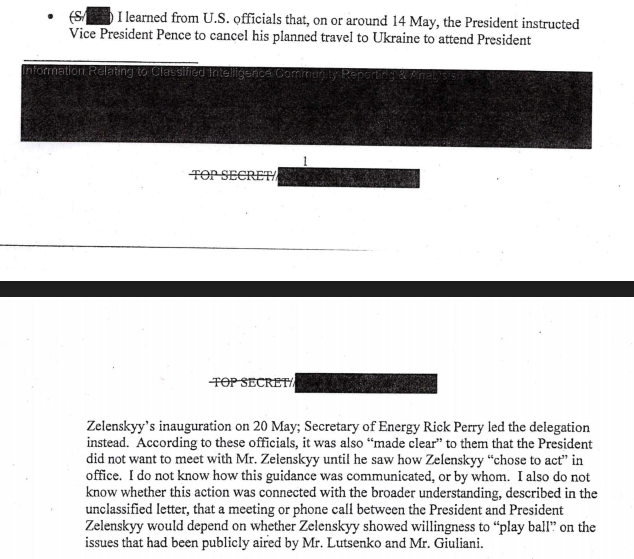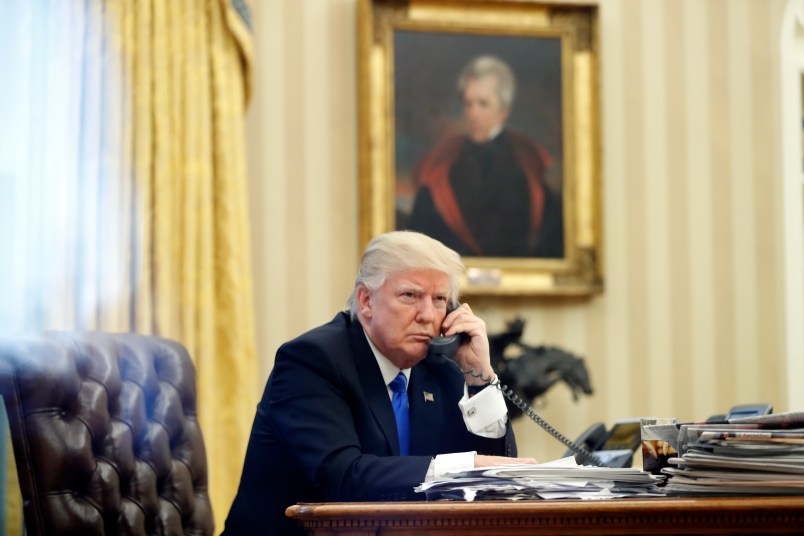As acting Director of National Intelligence Joseph Maguire testifies about his handling of the whistleblower complaint, we’ve had time to go through and pick apart the complaint itself.
While it deals in part with the now-infamous July 25 phone call between President Trump and Ukrainian President Volodymyr Zelensky, it offers a wealth of revelations, and potential questions going forward.
Here are key questions and takeaways from the report.
How Many Transcripts Can The Classified Servers Hold?
Stuffed deep in the complaint’s appendix is the revelation that, according to the whistleblower’s sources, “this was ‘not the first time’ under this Administration that a Presidential transcript was placed into this codeword-level system solely for the purpose of protecting politically sensitive — rather than national security sensitive — information.”

To unpack that a little bit: the whistleblower alleged that White House staffers placed the record of the July 25 phone call between Trump and the Ukrainian leader in a separate electronic storage system normally used to store highly classified information. The complaint suggests that this was part of an effort to “lock down” access to the document.
That’s a serious enough allegation with respect to the call with Zelensky, but the whistleblower suggested that this was “not the first time” that White House officials took this step.
It’s worth keeping in mind here that early on in Trump’s presidency, the transcripts of calls with the leaders of Australia and Mexico were released to the press, embarrassing him and his administration.
The whistleblower provides no further details on what transcripts were placed in what’s effectively an electronic vault, and what the political concerns at play in those cases may have been.
Who Knew What?
The whistleblower alleged that around “a dozen” White House officials listened in on the call, and that “everyone expected it would be a ‘routine’ call with a foreign leader.”
That does not jive with some reporting which has suggested that top national security officials fretted about, and even attempted to delay, the July 25 conversation, worrying that Trump would attempt to steer it towards pressuring Kyiv to manufacture information for his political benefit.
But the complaint provides more alleged details on how officials later briefed others in the State Department and intelligence community about what happened on the call. The whistleblower inexplicably names one State Department official — a staffer of Secretary of State Mike Pompeo’s — named T. Ulrich Brechbuhl as one of the people who listened in on the call.

John Solomon, Really?
The whistleblower suggests Giuliani’s pressure campaign began around the same time that conservative journalist John Solomon published a series of pieces in the Hill dealing with Ukraine.
Solomon is known as a conduit for conservative opposition research. Once an investigative reporter for the AP, Solomon has spent the last 13 years drifting toward the fringes. I wrote here about about his series of articles in March and April 2019, which provide a skeleton for a number of debunked allegations that Trump and Giuliani have pressed Kyiv to substantiate.
They include the now-familiar charge of Biden firing a Ukrainian prosecutor to protect his son, as well as separate allegations of collusion between the DNC and Ukrainian government during the 2016 election, and a separate accusation that the Obama-appointed U.S. Ambassador to Ukraine Marie Yovanovitch gave Kyiv a “do-not-prosecute list” of corrupt officials that supported the U.S.
There’s no evidence for any of the above, and a lot of convincing evidence against it. But how did John Solomon end up laying out the narrative that Trump and Giuliani have tried to fill out?
Delaying A Meeting With Zelensky Was Part Of The Pressure
The complaint alleges that “the Ukrainian leadership was led to believe that a meeting or phone call” with Trump was tied to a “willingness to ‘play ball'” on the issues that were advanced by Solomon.
Getting a meeting with Trump — the leader of one of Ukraine’s chief allies and financial backers — was crucially important for Zelensky, as I wrote about here.
The complainant also alleges, in a heavily redacted section, that Trump’s decision to send Energy Secretary Rick Perry to Zelensky’s inauguration instead of Mike Pence may have been part of the pressure campaign.

The State Department’s Role
The complaint suggests that top government officials were “deeply disturbed” by the pressure campaign in general, and by the July 25 call with Zelensky in particular.
It singles out two State Department officials — Ambassador to the EU Gordon Sondland and Special Representative for the Ukraine Negotiations Kurt Volker — as having sat down with Giuliani and given him a good talking to “in an attempt to ‘contain the damage’ to U.S. national security.”
Those two officials also purportedly spoke with members of the Zelensky administration in a bid to help them “navigate” the situation, and specifically to “respond to the differing messages they were receiving from official U.S. channels on the one hand, and from Mr. Giuliani on the other.”
At the same time, it appears from the complaint, those officials themselves had to navigate their way around Giuliani.
One day after the July 25 call, both Volker and Sondland flew to Kyiv, while Giuliani attempted to establish contact with people across Zelensky’s government at what appears to be exactly the same time.
A Surreal Cast Of Characters From Ukraine
Giuliani allegedly involved himself with a bizarre crew of Ukrainians, some representing the government, and others apparently freelancing.
At the time of his Aug. 2 meeting in Madrid with Andriy Yermak, an adviser to Zelensky, Giuliani was also trying to contact a man named Ivan Bakanov — the acting head of the Security Service of Ukraine, the successor agency to the KGB. Bakanov and Yermak purportedly were planning a trip to Washington in August.
Also at the same time, Giuliani was meeting with other Ukrainians not directly affiliated with Zelensky’s government.
Those include Nazar Kholodnytsky, a former Ukrainian prosecutor who was accused of throwing corruption cases by offering suspects advice on how to skate on charges. Yovanovitch, the former U.S. ambassador, had demanded that the Ukrainian government fire him before Giuliani apparently fired her.
The whistleblower also cited Giuliani’s meeting with Andriy Telizhenko, a former staffer at Ukraine’s embassy in Washington who has been the main person alleging supposed collusion between the DNC and Ukrainian government in 2016.
Telizhenko, for his part, blamed George Soros in a Thursday tweet.
mention of me being an ally of Lutsneko or the PGO is what the pro-Soros people like Sergey Leshenko always talk about. Clearly a Soros whistleblower narrative – is it @RepAdamSchiff? @realDonaldTrump @RudyGiuliani @JackPosobiec https://t.co/9j7QqD2WWN
— Andrii Telizhenko (@AndriyUkraineTe) September 26, 2019
An Attack On A U.S. Ambassador?
An enduring question through all this has been the April 2019 firing of Yovanovitch from her position as U.S ambassador to Ukraine.
The complaint alleges that Yovanovitch’s “tour was curtailed because of pressure stemming” from the allegations made in the Solomon columns.
The whistleblower cited Giuliani as telling a Ukrainian journalist two weeks after Yovanovitch’s removal that she was fired “because she was part of the efforts against the President.”
What Did Bill Barr Know?
The whistleblower wrote in the complaint that Attorney General Bill Barr “appears to be involved as well.”
It’s not clear what that involvement would be. The Justice Department issued a carefully-worded statement on Wednesday after the release of the record of the July 25 call, saying that Barr only learned of Trump’s conversation with Zelensky when the DOJ received a criminal referral.
The statement did, however, leave open the possibility that Ukraine could play a role in the ongoing investigation of the origins of the Trump-Russia investigation. That probe is being conducted by former U.S. Attorney for Connecticut John Durham.
“While the Attorney General has yet to contact Ukraine in connection with this investigation, certain Ukrainians who are not members of the government have volunteered information to Mr. Durham, which he is evaluating,” the statement reads.






